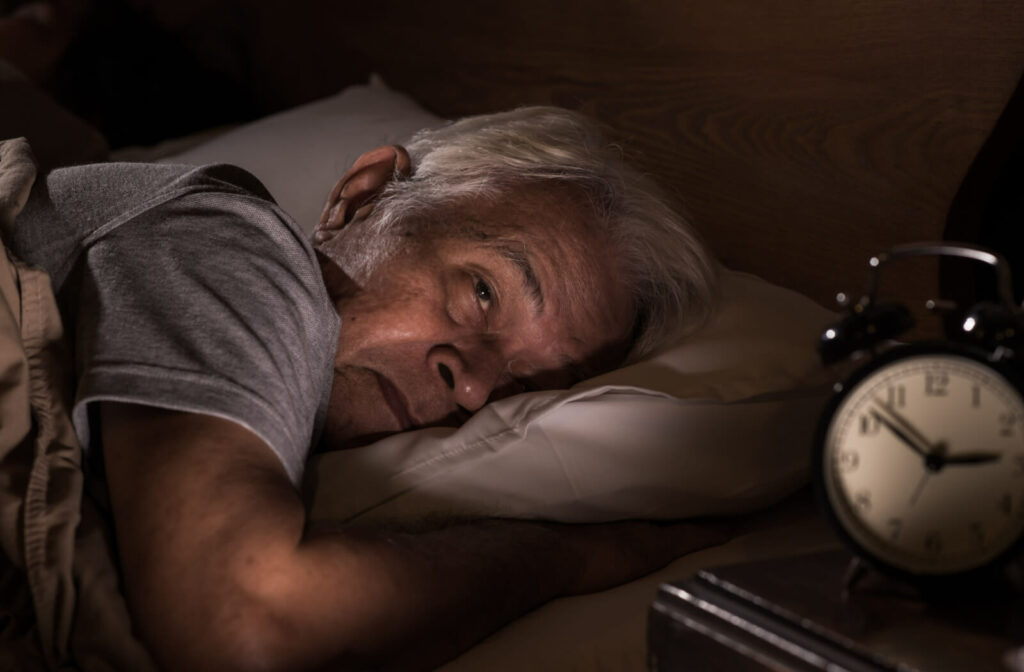Dealing with insomnia can be a difficult thing, and this is especially true as you get older. Struggling to sleep can make nights long and mornings frustrating. Those affected by insomnia may feel tired and sluggish throughout the day, just to repeat the cycle all over again.
Many people deal with insomnia in their lives. Fortunately, there are also many different treatment options available.
Treating insomnia for seniors should start with finding out the root cause and addressing it appropriately. Speaking with a doctor can help determine whether an underlying medical issue is causing sleep issues.
Sleep is a vital part of a person’s quality of life. A comfortable sleeping environment is one of the most important things a person can have, and that includes a space that suits senior lifestyles with support for needs related to independent living and memory care, as well as enriching amenities.
What Is Insomnia?
Insomnia is a common sleep disorder that affects almost half of all seniors in the United States. Those with insomnia struggle with falling or staying asleep most nights. Even if you have a perfect sleeping environment, you can still experience insomnia at some point in your life.
Often caused by stress or drastic environmental changes, this condition can have all kinds of effects on your life. For example, insomnia could cause:
- Drowsiness during the day
- Slower reflexes
- Temporary memory loss
- Irritability or anger
- Depression or anxiety
- Decrease in focus
- Exhaustion
- An overall decrease in function throughout the day
Though it varies from person to person, most people need between 7-9 hours of sleep every night. Since insomnia can make it extremely difficult to fall or stay asleep, it can have a detrimental effect on your day-to-day life. If insomnia starts to seriously impact how well you function throughout the day, you should visit a doctor.
Common Causes of Insomnia
As you age, it’s common to lose sleep more and more often. In fact, it’s suspected that with every decade that passes after mid-life, you get nearly 30 minutes less sleep every night.
For older adults, life can have all sorts of twists and turns. You may experience new kinds of stress, like paying off a new mortgage or a vehicle, and all kinds of changes. People move, work situations change, and environmental factors come into play—life is never stagnant! And one thing that can certainly change with time is your sleep pattern.
Since insomnia is often caused by stress, it’s perfectly normal to suffer from sleep difficulties when changes affect you. Some of the most common causes of insomnia include:
- Stress
- Anxiety
- Environmental noise or light
- Substance abuse or withdrawal (including nicotine, alcohol, and caffeine)
- Sleep apnea
- Too much screen time (blue light exposure)
Treatment Options for Insomnia
The best way to treat insomnia often starts with visiting a doctor. They can help determine whether insomnia is being caused by an underlying medical condition. If they suspect a sleeping disorder may be the cause, they may recommend a sleep study to properly diagnose and begin to address insomnia.
One of the best ways to treat insomnia at home is by practicing good sleep habits. This is the practice of making sure your sleep environment can support your chances of getting a good night’s sleep.
Some ways you can improve your sleeping environment include:
- Having a consistent bedtime
- Keeping your bedroom a good temperature (most people prefer around 65° F)
- Having a comfortable bed and pillow
- Removing electronics from around your bed (try to avoid having a TV in the bedroom!)
- Avoiding eating before bed
Insomnia can be an extremely frustrating thing to deal with, but you can take steps to address it. By building a healthy sleep environment, you can increase the chances of getting a good night’s sleep uninterrupted by insomnia.
Here at The Villages of Murfreesboro, we take pride in knowing our residents have access to everything they need for a supportive sleep environment. Reach out to us today to see for yourself!




